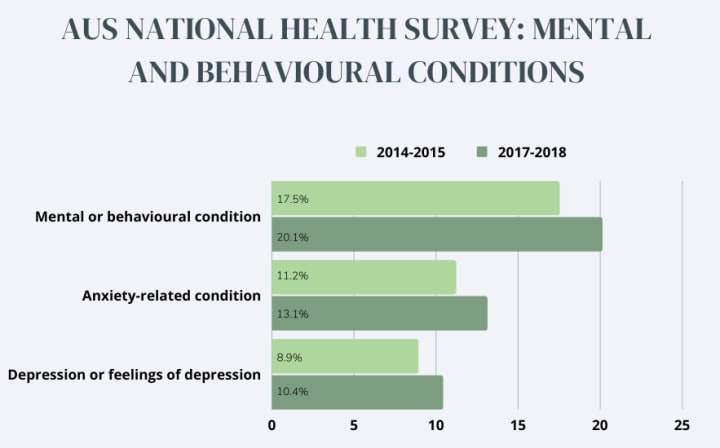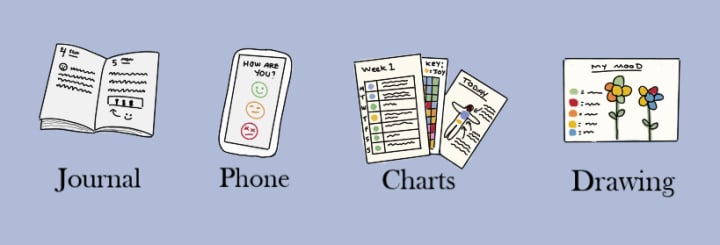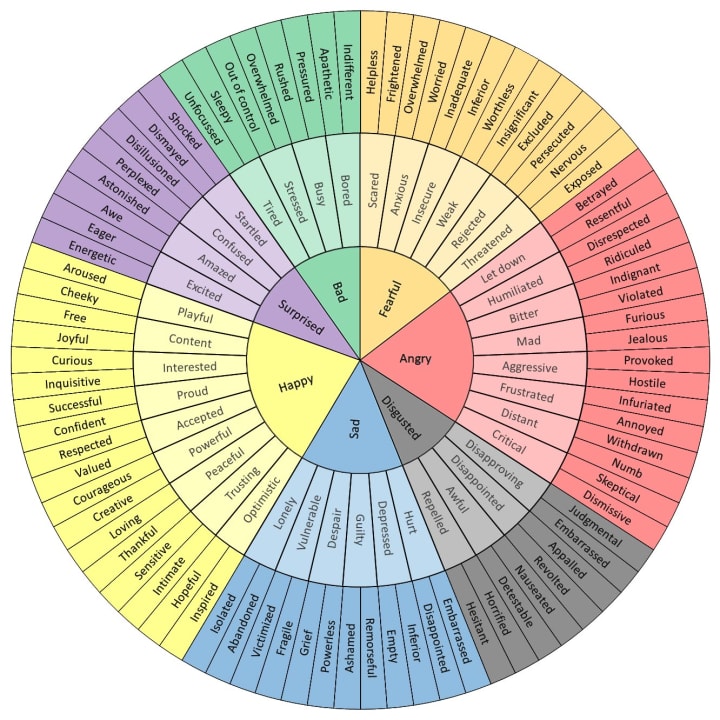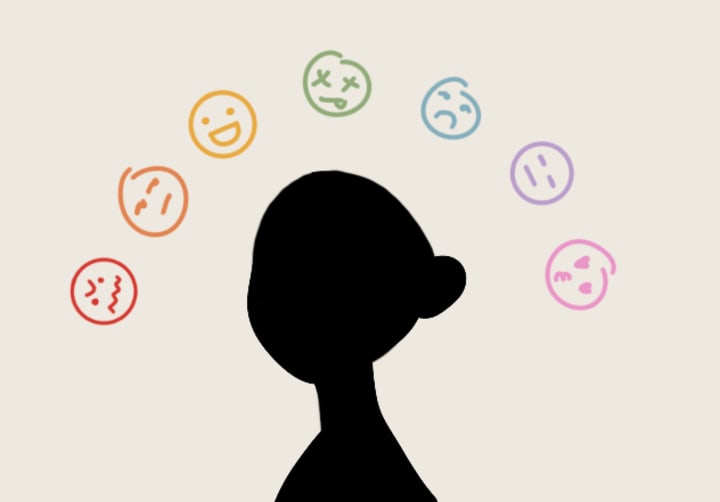Why you feel sad out of the blue
How mood tracking can help understand your emotions.

Do you ever wonder why you're in a bad mood for no apparent reason? Feel your good moods begin to turn south out of the blue? Has forcing yourself to always be happy left you emotionally exhausted? A possible answer is that you are not properly regulating your emotions.
What is Mood Tracking?
Mood tracking or mood monitoring is a technique that is used to keep a record of a person's moods over time. Its purpose is to help look for patterns in our moods and how they vary over time and in different circumstances and situations.

Why is it important to Mood Track?
In essence, mood tracking is a way to improve your emotional awareness. Often when people find that their emotions are coming out suddenly or coming on very intensely, it is because they were unaware of the feeling when it was present at a lower, more manageable intensity. To create a 'wise mind,' it is crucial to understand what emotion you are feeling and what it is trying to communicate and decide whether or not to act on it when you first notice it. Perhaps you struggle to identify emotions or feel as though you don't experience any emotions. You are still experiencing these feelings but are leaving them unchecked or choosing not to acknowledge them. This could lead to these emotions coming out in unexpected and explosive ways later on. Thus by increasing one's emotional awareness, one can begin to communicate emotions at the moment instead of bottling them up. Clearly identifying how we are feeling has been shown to reduce the intensity of an experience because it re-engages our rational mind.
Users of mood-tracking apps were primarily motivated by negative life events or shifts in their own mental health that prompted them to engage in tracking and improve their situation. In general, participants felt that using a mood-tracking app facilitated self-awareness and helped them to look back on a previous emotion or mood experience to understand what was happening. (Published online 2021 Aug 11)
The benefits you could start to see are stronger emotional regulation, more positive emotions, better communication skills, the ability to recognise your triggers, and the list goes on and on.

The findings from the Australian National Health Survey: First results reveal a worrying statistic in which 4.8 million (20.1%) Australians had a mental or behavioural condition in 2017–2018, an increase from the 4.0 million (17.5%) in 2014–2015. If this pattern continues it could lead to even more millions of Australians struggling with mental health-related issues. With mental health becoming more mainstream it also means that many are taking the initiative to reach out and get help, in 2020–21, 3.4 million Australians aged 16–85 (17%) years saw a health professional for their mental health. If you have taken that first step to better your mental health, then tracking your mood on top of that can aid you in better understanding the triggers that can cause negative emotions which can then be related to your health professional.
Many people who struggle with anxiety, depression or other emotional disorders may try to dampen their fluctuating or complex emotions with dangerous behaviours involving the excessive use of drugs or alcohol. By tracking the changes in your mood, it may also help you figure out what triggers those shifts. Once you begin to understand your triggers, it can help to put some strategies in place to manage your moods better. Although some may make the connection that all those late nights have given you a short temper, others may struggle to make that association or believe there must be another part to the story.
This is where mood tracking comes in handy. When monitoring your moods, it is essential to:
- Name the emotion you are feeling (this can be on a scale from 1–10 or directly naming the emotion)
- Identify possible triggers (lack of sleep, getting a new job, upcoming exam)
- Try to note down something every day (for at least two weeks)
- Keep track (this helps determine possible patterns in an accessible form)
. . .
Ways to Monitor your Mood
Montering can be done in a variety of ways. These include:
- Daily journal: Writing in a daily planner, diary or calendar. This method allows for in-depth details of your day for those who enjoy writing and taking time to reflect.
- Mobile apps: There are countless mood tracker apps available on the app store and are easily accessible for people who always have their phones on them. These focus on recording mood, events and daily activities. The only struggle would come from finding the right app for you.
- Mood chart: A chart can be drawn up on paper or on a device that involves checking your mood daily and noting any external factors that relate to your mood. It is a convenient way to identify patterns.
- Visual tracker: For those who prefer a more visual tool over word-heavy trackers. Drawing pictures or using a mood mandala allows you to colour in the areas where each colour describes an emotion.

* If you are struggling to keep up with your mood tracking, consider setting a reminder or notification to remind you.
What Moods am I meant to track?
Well, anything you think is necessary, and it doesn't just have to be all "the bad". It is equally as important to acknowledge the positive emotions as well as the negative ones. Not everyone experiences emotions the same way. So it's important to find your style when noting down your feelings. However, it is critical that you begin to name and understand your feelings. Here are some ways to begin identifying your emotions:
- A scaling system where 1 may represent severely depressed, and 10 is feeling fantastic. This may be easier for people that are just starting out and are still struggling to identify emotions by name.
- You may like to break emotions into positive and negative categories. Where in the positive category are emotions like happiness, pride and love, and in the negative section are anger, sadness and shame.
- Once you begin to understand the nuance of your emotions, it may be time to expand your vocabulary and use something like an emotion wheel. Where you can reflect deeper on your emotions by branching out, happiness = acceptance = valued.

It can also be noted that if you are still having trouble naming the emotion, try tuning in to how your body feels and also what your body is telling you to do. If you are feeling hot and have the urge to punch someone in the face, you are most likely feeling anger. Try reading this Emotion Regulation Handout if you are still struggling to understand your emotions (this will be helpful for those who may like to look at things more logically). For ten common emotions, it provides prompting events, interpretations, biological changes, expressions/ actions and the aftereffects of feeling that emotion.
Once you know what emotion you are feeling, it is time to reflect on if this emotion was appropriate to the situation. Therapists may call this "checking the facts." Does your emotional response and the level at which you felt it match the circumstances that caused it? Did you overreact, or perhaps you should have reacted?
. . .
Mood Monitoring works differently for everyone
Mood tracking is one of those things where it's only as useful as you make it. Working on improving your mental health by mood tracking doesn't necessarily lead to immediate solutions, and feeling the results may take time. HOWEVER, don't be discouraged and continue journaling and fine-tuning your coping mechanisms to find what works best for you.
You've done it!
You identified the emotion, what caused it, and if it was appropriate, and it's all noted down in some way. Now you just have to keep going until you find yourself able to experience emotions not just in the moment but in a healthy and comfortable way that becomes natural to you.
Overall, mood tracking can help you build a deeper connection to yourself.

* DISCLAIMER: I am not a health care professional, just someone with experience and a lot of research.
* All images and illustrations belong to me unless stated otherwise.

About the Creator
K. Ross
I write articles about human experiences with a keen interest in art, psychology and society. I post about once a month.
Reader insights
Nice work
Very well written. Keep up the good work!
Top insights
Eye opening
Niche topic & fresh perspectives
Easy to read and follow
Well-structured & engaging content
Expert insights and opinions
Arguments were carefully researched and presented
Heartfelt and relatable
The story invoked strong personal emotions
Masterful proofreading
Zero grammar & spelling mistakes
On-point and relevant
Writing reflected the title & theme
Excellent storytelling
Original narrative & well developed characters
Compelling and original writing
Creative use of language & vocab







Comments (10)
check this https://vocal.media/humans/psychological-facts-d9wr00x3
I recently read your article "Why you feel sad out of the blue: How mood tracking can help understand your emotions," and I wanted to reach out to you to express my appreciation for your insights on this topic. I found the article to be informative and thought-provoking, and it has given me some valuable ideas on how to better understand and regulate my own emotions. Your explanation of mood tracking and its benefits was particularly helpful, and I have already started using some of the techniques you suggested to monitor my moods and identify triggers. I believe that this practice will help me improve my emotional awareness and overall mental wellbeing. Thank you again for sharing your knowledge and expertise on this important topic. I look forward to reading more of your work in the future.
Very well written!
Good
Insightful, Ross. Pretty impressive with the research for this article. How do you track your mood?
确实不一般
Wow, this was really good. I really think this will help and this is good advice. I definitely liked and saved this story for later as a reference.
Amazing article. This good 11/10
I was taught something similar to this in therapy, and it really helps me when I can't work out my feelings. Your article is fantastic.
Interesting